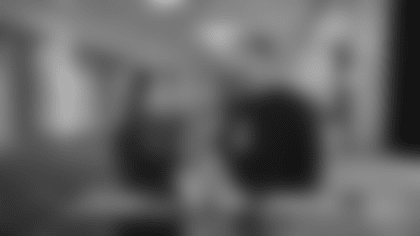Vikings Offensive Coordinator Kevin Stefanski
Thanks for coming out everybody. Really pleased to announce our offensive staff. There will be a couple new additions in here and I think our PR staff will hand out a release and some bios on a couple guys. We are going to start with Rick Dennison, our offensive line/run game coordinator. Really enjoying having Rick here in the fold. I think the guy is a super impressive coach. A brilliant guy. You talk to him and his understanding of scheme and technique is really cool as we dive in to some of our conversations so thrilled to have Rick here. Andrew Janocko is going to stay in that offensive line room as our assistant offensive line coach. He does a great job. Really pleased to have him there. He sees the game from a couple different perspectives, which I think is important. Really looking forward to working again with Andrew. Christian Jones is one of our new offensive quality control coaches. Christian is coming to us from the University of Texas, sorry Kub [Gary Kubiak]. He was a grad assistant there for a year, played wide receiver at Northwestern. Bright, young coach. We have the man right here, Gary Kubiak, our assistant head coach/offensive advisor. Coach Kub is somebody that as a young coach, years ago, and still young coach I hope, sat down and watched his offense and really just admired what the guy did with the offensive football team. Marrying the run and the pass game, which is a big part of who we are right now, and I remember sitting there and trying to watch and understand how he is handing those keepers back then. So now I have the guy in the room with us and that is the coach. And I can tell you the person, the guy's reputation is sterling as I'm sure all of you know. Pleased and excited to work with Coach Kub. Klint Kubiak is working with our quarterbacks. Klint and I know each other well, worked together closely with Klint a few years back. He is as hard working as there is in the business. I love his demeanor. I think he is going to be great for the quarterback room. I think he is going to be great for Kirk [Cousins]. They are going to really hit it off. He knows a ton about football. He's worked with wide receivers before, quarterbacks so again, a good perspective. Brian Pariani is our tight ends coach, somebody that I got to know when I was in the tight ends circuit there for a few years. You look at the players that have played for Brian and it's an impressive group, a productive group and it's been really fun having Brian a part of this. AC Patterson is our other offensive quality control coaches so we have two offensive quality control coaches. AC was here the last couple years in our minority fellowship internship program. He is coming most recently from Portland State where he's coached running backs, offensive line, tight ends. A really well-rounded, young coach that I am really looking forward to working with. Drew Petzing is moving over to wide receivers so he'll be our wide receivers coach. Drew has been here with me for a few years. Again, kind of a theme there, he's worked with running backs, he's worked with quarterbacks, he's worked with wide receivers. He coached defense in college so he is kind of our resident defensive expert so, again, I think he is going to work really well with that room. That room knows him. That room has heard him stand in front of the room and talk, install and talk about the upcoming opponents. Really looking forward to working again with Drew there with the wide receivers. I think he'll do a great job. Finally, last but not least, Coach Polamalu, Kennedy Polamalu, running backs coach who I know everybody knows well. Best in the business. KP's demeanor is great for our running backs, it's great for our offensive staff. Again, it's a great group. Coach [Mike] Zimmer and Rick [Spielman] have worked with these guys and it was a great process putting this together and I think we are really pleased with our final product.
Q: When did the prospect come up on your radar to adding Gary Kubiak to the staff?
A: I don't remember exactly when but I will tell you from my perspective, as a first-time coordinator, I would have been foolish not to go do everything in our power to bring a guy who has been in seven Super Bowls as a player and a coach. Called the plays the last time he won the Super Bowl. As a resource for me, I can't tell you how lucky I am as we are putting our system together. We talked about pulling it apart and putting it together and as we put this together, I have a resource sitting right next to me who has done it and done it at a high level and it's really pretty special.
Q: Was it more if Gary Kubiak was available or that you needed someone in that role and then went to find it?
A: I don't specifically remember how that happened. I just know when it was available with Coach Zim, myself, with Rick again, we said, "This is a no-brainer. We have to make this happen."
Q: What are some of the key things that you hope to learn from him and that you already have learned from him?
A: I think not getting too specific, I'll just tell you, as a resource, Coach Kub has done it at a really high level. Has called it, coached quarterbacks. There are times in the run game or pass game, it could be a play action, it could be a movement, where I think Coach has a unique perspective. I can tell you just from being in our meeting room, these past few weeks and as we go forward, it's been really, really helpful.
Q: How do you balance using Gary Kubiak as a resource but making the offense your own?
A: I think it's the Vikings offense. I think Coach Kub and I, again, see the game pretty similarly. I think there is very open and honest dialogue with Coach, Rick Dennison and Klint Kubiak. All of us are in there. And I should mention Coach Zim. Coach Zim sits in our meetings and gives us a different perspective. I think that is really healthy to have that. I can just tell you, again having been in our room now, the dynamic is outstanding. I am really looking forward to our staff.
Q: How does Gary Kubiak fit into that in the role of assistant head coach with you and Coach Zimmer's shared vision?
A: I think I'll let Coach speak to that also, but I just think we all kind of see the game the same way. We sat in our meeting rooms as a staff with Coach Zim in there and said, "Who do we want to be moving forward?" And I think there's no secret amongst that staff where we are and where we want to be moving forward. I can just tell you having sat in there and gone over the run game and the protections and we have hit it all, I can just tell you there's a very unified vision moving forward.
Q: How helpful is it that a lot of members of the staff have worked together in the past already?
A: Correct. I think that is helpful and I think it's helpful as we talk and as we have discussions. There is a history in a bunch of different ways with us. I think it's a shared respect, too. It helps and as we have our conversations and decide who we want to be, I think it's helpful everybody knows where we are coming from and there is some respect across the board.
Q: Are the responsibilities as far as play calling set in stone? Will you be calling plays?
A: Yes.
Q: What is it about Gary Kubiak's offense that helps the quarterback?
A: I think Coach, more for the focus of us moving forward, where we want to help our quarterback is we want to be, and I talked about it and something that I think we all believe in, is we want to be unpredictable. We want to be a run team. We want to be a pass team. We want there to be that marriage between the run and the pass game and that is something that Coach has hung his hat on over the years and that is going all the way back to his days- It's pretty cool when you're telling stories and they're linking all the way back to Bill Walsh is pretty cool.
Q: Are you looking for a certain type of player in free agency and in the draft and has that changed at all now that Gary Kubiak is on?
A: I think we as a staff have sat with Rick and with the personnel group and outlined the specific players that will fit with what we are doing moving forward. I certainly think that knowledge helps as we start the free agency program and as we get into the draft. I think certainly those conversations has helped.
Q: Are you still working through some of the details of the offense?
A: We are working through the details. Luckily, we have until April 15th before the players get back and we have to hand them a book. We are being diligent about this thing. We started with the run game and we went over every run and a lot of that it's ad nauseam. We are trying to just so that when we started and we are all on the same page at that micro level, I think will serve us well moving forward.
Q: How much does Gary Kubiak's history with Mike and Kyle Shanahan, both who know Kirk Cousins very well, help build that relationship?
A: I think that all helps. It's no secret Kirk came up under both Coach Shanahans and had some success in that system. There are a lot of similarities then to what we are doing moving forward. There are a couple, obviously you evolve I would hope year-to-year and I hope really week-to-week that our offense looks different.
Q: How does a run game coordinator with all that you are doing?
A: Rick Dennison, again thrilled that Rick is here, because Rick has really been in charge of that run game. What that allows us to do is when we get into game plan mode, Rick is really at the forefront of it. Of course there are going to be ideas from everybody. Kennedy Polamalu, Brian Pariani, but Rick is kind of in charge of putting that game plan together and then we sit with Rick and say, "Alright, let's look at the formations that you have," and we are going to build off of that and we are going to build these schemes, these passes off of that. I think in the game plan world of coordinating a run game, I couldn't be more pleased with having Rick Dennison doing that.
Q: Does it take more time to put the game plan together when you have two guys working on different things or is it streamlined?
A: I think it streamlined. That is why we have all these meetings right now so that we are all on the same page. I think just in terms of divvying up jobs and how we are going to attack a week, I think Rick certainly, when we are game planning and even now, he is the expert in the run game. We are talking through what the run calls are and talking about each run and the reads and he is out in the forefront of that. I think it's really helpful.
Q: How do you manage the team of coaches?
A: I like to be surrounded by smart people. I am really thrilled that there are a couple more people sitting at our table now, at our staff room. It's just helpful to have a bunch of smart people around. Looking across the board at the guys that we were able to put together, I can just tell you that it's made my job easier having a bunch of experts in their areas, smart people, around because it is a resource to me.
Vikings Assistant Head Coach /
Offensive Advisor Gary Kubiak
First, let me just say, I want to thank the Wilf family, Rick [Spielman] and Zim [Coach Mike Zimmer] for giving me this opportunity. Obviously I've been in this league for a long time. I love this league, I love the game, and to have a chance to get back in that room and get back in that foxhole and battle a little bit, I'm really looking forward to it. It's great to be here.
Q: What was your role in Denver as the senior personnel advisor?
A: You know, what I really did, two years ago I worked from home, actually. I worked from my farm, evaluated all the college players. Last year I was back in the building, I was in the building full time. I watched practice every day, I evaluated all the college players coming out in this year's draft, so I'm kind of way ahead from that standpoint. I was involved that way on a daily basis.
Q: What do you envision your role helping Kevin Stefanski will look like?
A: You know, it's funny, I'm sitting up here watching Kevin up here with you guys today, and it's interesting to me because it reminds me a lot of how I grew up as a coordinator. I was a young guy, Mike [Shanahan] threw me in the room as an offensive coordinator. I was in there with Mike Shanahan and Alex Gibbs, they pounded on me every day and made me a good football coach, taught me how to do things, how to teach, how to handle players, how to handle a group. I watch Kevin work every day, we got a good group in our room. We've got some veteran guys that have done this a long time, and we've got some very bright young coaches on the way up. Kevin's a very smart guy, but he's great with people, so I've been very impressed.
Q: What was the genesis of you ending up here in Minnesota? Who contacted who?
A: After doing the personnel for a couple of years in Denver, I knew I wanted to do some more. When I stepped away from football a couple of years ago, I kept working, but I found myself wanting to do some more and more. As things went on, they had their direction there. John [Elway] made a great hire in Vic [Fangio]. What a tremendously qualified man in their direction. So we talked a little bit, and I made a decision. Hey, I'm going to get out there and go a little bit longer and try to win a few more games. I've known Zim for a long time, I respect him as a person, I respect him as a coach and I respect how he tries to win. So we've had some conversations through the years, and so it was an easy talk for me, to visit with him and think maybe they might be interested in me doing something like this. It just worked out that way, and I just feel very fortunate to be here in such a great organization.
Q: Did you feel throughout last season that you wanted back in a coaching position?
A: Yeah, I wanted to be smart. I knew I didn't want to come back and be a head coach. I knew I wasn't going back in that direction, but I did want to be involved. I missed it. Heck, when I was involved with the personnel, let's face it, I didn't get a lot of calls from people to ask me to come work in personnel, but people asked me to stay involved with coaching. This gives me an opportunity at this stage in my career to still be involved. It's a unique opportunity, the way this thing has set up, so I'm looking forward to it.
Q: Do you think it'll be hard at all not to call plays?
A: No, I look at it this way; I've called plays in this league for 25-plus years. I can tell you, I don't think I ever went to a game where I called everything myself. Whether it was Mike [Shanahan] coming on the headset saying, "Hey, Kub, how about this?" Or whether it was Rick Dennison or Mike Sherman or Kyle Shanahan, who worked for me. I think as a group, Kevin [Stefanski] has got a job to do. It's our job as coaches to help him in any way we can, and when you got people [like] me who has called games, Dennison who has called games as a coordinator in Buffalo, I think we've got a lot of experience around him to help him out.
Q: It's such a passing league now. Can you dominate in the run game and still win big in the NFL?
A: I think you got to do what you got to do to win. But the head guy here wants to be physical, and he wants to be mentally and physically tough as a football team. I think that's where winning starts. Personally, every good offense I've ever been around runs the ball pretty good. I sat there and watched New England run the heck out of the football this season. I believe in that, I think it gives you a chance to make big plays, so as Kevin said we're trying to marry everything we're doing run and pass, so it gives us an opportunity to do that.
Q: What do you think is the source of that that you and Rick Dennison and Brian Pariani have had over the years?
A: That's a good question. I don't know, we've just done it a long time together. We've been in a lot of battles in this league, Rick and Brian and I, probably 250-plus football games in this league coaching together. We've been around some good coaches, good leaders, so that's helped us along the way. But I think the unique thing about us coming here with Kevin, it gives us an opportunity to do something quickly. We can flip a switch real quick, get in a room, we're all on the same page instead of eight guys coming from eight different places. I think it's helped us get up and running pretty quickly.
Q: In the two years since you've stepped out of the rigors of head coaching, what do you think you've learned about your own health and well-being?
A: Well I'd probably say the same thing a lot of guys say. It really makes you appreciate what you're a part of. I've been in this league 30-some years as a player and a coach. Heck, I missed it, I really did. There's just something about at the end of the week, did we get a W or not? That feeling. The working in personnel was fun, and I enjoyed that portion of it, that's challenging as well from a draft standpoint and putting a team together, [but] I missed being in there with some of those coaches and battling each week. I love being around players, I love to teach, so this gives me an opportunity to get back and do that.
Q: When did you first meet Kevin, and what have your impressions been of him?
A: I've known Kevin a little bit through my son, but actually I studied a lot of young coaches last year. A lot of this young guys have gotten jobs and become head coaches. I studied a lot of young coaches, and knew a lot about Kevin from that standpoint had a lot of conversations about him. He's got a bright, bright future.
Q: Given that you played quarterback as well, what will your relationship be like with Kirk Cousins? How much do you want to work independently with him?
A: I think it helps you look through the eyes of a quarterback. I put myself in that pocket when he's back there. What would I think here, what would I think about that call or that situation. I know a lot about Kirk, I studied him coming out, obviously got to know him through the draft process, and then I got to know him even better through Mike [Shanahan] and Kyle [Shanahan] through the years. I know he's driven to succeed, he's a hell of a player and we got to do everything we can to help him out. I look forward to that relationship. Hopefully being in there a little bit, what little bit John [Elway] let me plan my career, hopefully I can recall some of those things.
Q: What makes Rick Dennison an expert in the run game?
A: He's an engineer by trade, you all know that right? So he's too smart, he's so smart. He's in there, we give him a hard time all the time. But Rick was raised under Mike [Shanahan] and Alex Gibbs scheme wise, so he's a great teacher in how to break things down and how to start from the bottom up in what he's trying to get done. Somebody asked a great question, how Kevin would want to go about marrying the run and the pass, having a run coordinator, actually I think it's a huge help. I know for me as a play caller for all them years, having Rick design the run game, come to me and help me go marry what we're going to do pass wise with his run schemes that week, I think it's a big plus.
Q: Can you give an example of a time Rick Dennison has seen something that you didn't see?
A: Oh yeah, when I called games with Rick I was 100 percent confident [in saying], "Hey Rick, give me your top three runs when I go into this series. It's third and three, I want to run the ball, what do you want?" So I was talking to Rick all the time, and a lot of confidence in what he felt like we should do.
Q: What do you think of the Vikings offensive line that you have studied so far?
A: Obviously we're not with player yet, so our focus has been on all the coaches getting on the same page, getting the book together, getting ready to teach here in April. I know a little bit, obviously I've studied their past couple of seasons to look at players and get my opinion to Zim and Rick [Spielman] and those type of things. But really we just touched the surface right there. I would say we're more into our book right now and what we want to be offensively.
Q: How much can scheme impact the performance of offensive linemen?
A: Well, that's a tough question. You got to do what your players do best, you know what I mean? Obviously the word zone comes up a lot when you talk about us offensively and what we do. We've got to run some gap schemes too, you can't be so predictable. So I think we had to take a look at our guys and see how they fit and how we want to go about this, but I think that's why this offseason will be so important. Our ability to catch up and teach and be good teachers starting on April 15th is extremely important.
Q: How's your health?
A: My health? I'm good, I'm good. Other than this hip I had replaced a couple of months ago, I feel great.
Q: Coach Stefanski mentioned how you impacted him from afar. What does that do for you to hear young and upcoming coaches say that?
A: Well it makes me feel old a little bit, but we get in that meeting room and its fun. Now Zimmer comes in our meetings too, and I love that. As a coach I think that's so important, but we're getting Zim's defensive perspective, Kevin is getting my perspective on how I've taught through the years and how I may teach the progression for the quarterback, so you're getting a lot of information there. It's not just one set of eyes, you're getting a lot of really good eyes in there looking at things and we all get headed in the right direction.
Q: What makes Kevin Stefanski different in that mix of these young offensive minds?
A: I can't speak for Kevin but I would say looking from afar as an older coach who's done this, I love Kevin's path. How he's grown up. He's been in this organization what, 10 or 12 years. He started as an intern and now he is a coordinator. Kevin is going to be a head coach in the National Football League. I think that's really neat to see. I have a son here, obviously you all know that. Me watching him come up over the last eight or nine years, getting beat on a little bit, I use that word again, by some really good offensive minds in meeting rooms and stuff. I think Kevin's path is really good.
Q: What value have you had over the years with assistants who have worked in multiple position rooms?
A: I think it's really good because each room has a different way. You go in a tight end rooms, how do you go about teaching those guys? In an offensive line room, how do you break down your teaching? For Kevin, I know he's coached running backs, I think he's coached receivers, quarterbacks. It does give you a heck of a perspective. I was a running backs coach my first job in college. I was at Texas A&M. I wanted to go watch the passing game. I didn't want to, you know. Mike Sherman made me get in a room and watch the end zone film and he taught me how to run the ball and what his problems were as an offensive line coach. I think you learn to really appreciate the ability to come up that way.
Q: How good can Dalvin Cook be?
A: I am really excited to watch him play. I know he is coming off the injury and looked totally healthy at the end of last year. When you have players like that, you have to find a way to get the ball in his hands. Kennedy [Polamalu] does a great job with the backs. We have got a great group to work with.
Q: How do you envision game day going with your communication with Kevin Stefanski? Are you going to be in a booth talking to him on a headset or will you be down on the sidelines?
A: I don't want to get too far ahead of myself but it looks like I am going to the booth. I am going to help Kevin from up there. I love that, it's a great perspective up there. As a play caller, I think you need to be down there and get a feel for the game and what is going on from an emotional standpoint. Hopefully I can see the big picture up there and help all I can.
Vikings Special Teams Coordinator Marwan Maalouf
My name is Marwan Maalouf. I'm the special teams coordinator for the Minnesota Vikings. It feels good to say that. I'd like to thank a couple people before we get started, my wife Dana, my two boys, Mason and Morgan who are still down in Florida, Coach Zimmer and Rick Spielman. I'm looking forward to working with you guys and getting to know each one of you.
Q: You're a former offensive lineman, how did you go down the special teams path?
A: It probably started when I was a graduate assistant at Rutgers a long time ago. Greg Schiano was the head coach and he wanted us to learn all the phases, all three phases of football and at the time Darren Ruzzi happened to be the special teams coordinator. I would help him with the look teams and kind of get a little bit of experience doing that and that grew when I went to Cleveland in 2004.
Q: What was the process for you going through interviews?
A: I think it's been a great learning experience for me. I've never been in a hurry to be a coordinator. I've always wanted to do it again, obviously, but I feel like if you work and you learn from the people you're around at some point it's going to happen. It'll happen at the right place like being here.
Q: Minnesota has had some issues with kickers in the past. Do you have a game plan that you sold Coach Zimmer on?
A: It all starts with the evaluation process. Right now all things are on the table. We're starting to look at draft kickers, free agent kickers, and that's something that I've had good luck with in the past. We've always had good kickers where I've been and sometimes they haven't had the best years as well, but we've always had options. I think the most important thing is to overturn every rock and find somebody that fits what we're trying to do whether it's a veteran or a young guy.
Q: What do you look for in a kicker?
A: I think the basic things – the flight of the football, rotation, just those things being the majority of it. His technique, how he approaches the ball, his mental state. I think that's important too. Ideally we like football players who happen to kick and I think that if you find those type of guys those are the ones that stick through with longer success.
Q: What have you learned about coaching kickers?
A: Well, I think a lot of that stuff, especially the mental stuff starts with the evaluation process. Spending as much time as you can with them before you happen to sign them. I think when you do that it really helps the other stuff out. These guys are adults when you get them, so there's not much you can change. There's things you can tweak and being around some very good kickers during my career. I was able to learn from them. Those are the guys you really learn from Adam Vinatieri, Phil Dawson, Matt Stover – that's 60 years of experience right there. I probably took more notes being around those guys than anybody.
Q: What do you take away from their mental makeup?
A: Those guys happen to be really good football players. Some of those guys weren't kickers in high school. Guy like Phil Dawson was a wide receiver I think. Their mentality as far as being a football player first and then a kicker second. He just happens to be a kicker. That's what we try to find.
Q: What is your approach when a kicker goes through struggles? Do you talk to him more? Watch more film?
A: I think it starts with what type of person he is. If he's somebody that you're going to help more by being more technical with, if he's going to benefit from that I think spending time with him first and seeing what type of guy he is. You don't want to over-coach, you want to know when to back off, and when to approach him and maybe mention one or two things about his footwork or his technique, what his aiming points are and what he's thinking about prior to the kick. A lot of things with football is muscle memory. You don't want guys thinking, you want him to go react, be ready, and do their job.
Q: What have you learned philosophically about the special teams units here and do you see yourself instituting any new ones?
A: Well, I can tell you what time of team we're going to be. We want to be aggressive. We want to be a situational special teams unit. Whatever the situation in the game dictates is how we want to adapt to it. I think that's important. I think special teams can really compliment offense and defense based on what the situation is in the game. Being smart, no penalties – that's something that we pride ourselves on when I was with other teams, less penalties as possible. But we like to be aggressive too. Our system is built around our players and around our personnel and I like to think that's easy for our guys, but hard on the opponents. Unpredictability is a great thing as well. We're going to use all those.
Q: What is the key to an aggressive special teams unit?
A: Absolutely. It starts with the personnel. I love the guys we have here on our roster. I think putting them in the right situation, keeping the technique. We're going to spend a lot of time in OTAs and training camp with technique. Just like I spoke about before it's muscle memory. It's them getting off the ball knowing what to do when the ball is snapped, getting past the line of scrimmage, getting our hands up – just the little things that we're going to always practice. I think the majority of our time spent now once the players get here is going to be technique and I think that's what is really going to help block kicks and block punts.
Q: Having faced this team last season, is there anyone on the roster you're looking forward to working with?
A: Yeah, absolutely. I like Anthony Harris, Holton Hill, there's Ben Gedeon. There's a lot of good guys that I'm excited to work with and obviously there not here right now and we have to wait until they get here, but Jayron Kearse. There's a lot of good players that did a lot of good things on special teams.
Q: How much time do you spend on existing special teamers that are going to be free agents?
A: That's a top priority. We've already started to look at some of those guys and try to keep our options as wide as possible. I like what a lot of those guys did last year and all things are on the table for personnel and specialist.
Q: What is your perception of the kick return situation? They had guys like Cordarrelle Patterson and Percy Harvin in the past.
A: It's just going to depend on the draft and free agency. You're right Cordarrelle Patterson and Percy [Harvin] and all those guys, even [Marcus] Sherels, did a great job in the past. I think it's important that we keep building upon those guys and avoiding any lulls like you mentioned.
Q: How has the new rules changed how you approach kick returns?
A: As far as the time spent we still practice it quite a bit because I think you have to. I think more opposing kickers in general are mortaring the ball and keeping it in the field of play. The timing and spacing is the important thing on kickoff return. I don't think it's hindered us at all, I think it's getting the players to understand what the rules are and actually practicing them during a rep in practice is important. If a guy does miss his block we can't have illegal double teams and stuff like that. That's that we definitely address.
Q: What was your evaluation of Dan Bailey here and why he struggled a little bit more than he had in the past?
A: I'm still kind of in the process of looking at him and studying what he's done in the past. I know he hasn't been here long, so I don't know if that has something to do with it or not. And just building that relationship with him and the operation is important too. That's stuff that we're looking at.













